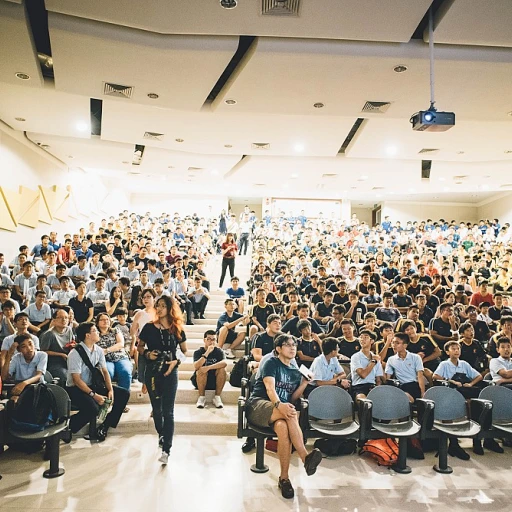
Understanding Hoteling Office Space
The Concept of Flexible Workspaces
As the future of work continues to evolve, the evolution of work has seen a significant shift towards adaptability and flexibility. Central to this transformation is the concept of hoteling office space. This system replaces traditional assigned desks with a more flexible approach where employees reserve workspaces as needed, enhancing space utilization and fostering a dynamic work environment.
In essence, hoteling revolves around booking systems that allow employees to reserve workspace, meeting rooms, and other facilities in advance. This model caters to the hybrid work trends, enabling employees to choose when and where they work within the office, thereby supporting both remote and in-office work patterns. The traditional office space layout is giving way to hot desking and hoteling software that facilitate a fluid and efficient allocation of desks and other resources.
Notably, while the term may conjure images of hospitality, hoteling in the corporate context pertains to a workplace management strategy aimed at maximizing the utility of available office space. By utilizing a desking reservation system, companies can effectively manage office space and ensure real-time availability of workstations, tailored to the dynamic schedules of their employees.
This adaptable framework not only meets the demand for greater flexibility among employees but also offers potential cost savings and increased productivity for businesses. The rise of office hoteling reflects a broader trend toward an agile workspace configuration, making it a focal point for organizations aiming to optimize their work environments in an era of hybrid work.
Benefits of Hoteling Office Space
Advantages of Embracing Flexible Office Arrangements
The adoption of hoteling office space presents numerous benefits for businesses and their employees. With hybrid work models becoming increasingly prevalent, offering the flexibility to book desks and meeting rooms as needed allows employees to tailor their work environment to their tasks, ultimately boosting productivity and satisfaction. One of the most significant advantages of hoteling is optimized space utilization. By moving away from assigned desks and embracing a system where employees reserve workspace as required, companies can maximize their real estate investments. This approach not only saves costs but also promotes an agile, dynamic workplace where resources are more efficiently managed. Hot desking and the use of hoteling software streamline the process of desk booking and management, allowing for real-time updates on space availability. This technology-enabled flexibility ensures workspaces are available for those who need them, eliminating the inefficiencies associated with underutilized office space. The ability for employees to book their desks and workspaces also fosters a more personalized experience, catering to individual preferences and promoting a sense of autonomy. This empowerment can lead to a healthier work-life balance, reducing stress and increasing overall employee satisfaction. Embracing workplace management practices ensures that companies remain competitive in an evolving business landscape. By leveraging the benefits of a flexible workspace strategy, businesses can accommodate diverse workstyles and enhance employee engagement.Challenges and Considerations
Navigating Complexities in Space Management
The transition to hoteling office space undoubtedly offers numerous benefits. However, it also introduces some challenges that organizations must carefully navigate. To successfully implement a hoteling strategy, companies need to consider the complexities associated with space management and reservation systems. One of the primary challenges is the need for an effective desk booking system that allows employees to easily reserve workspaces in real time.
Another difficulty lies in balancing space utilization with employee satisfaction. It’s essential to ensure that desks and meeting rooms can be reserved and utilized efficiently, avoiding situations where workers have to scramble for available spaces. An effective hoteling software solution plays a critical role here, as it can streamline the booking process and provide insights into space utilization.
Hybrid work models add another layer of complexity. In such setups, some employees may have assigned desks for specific days or times, while others rely on hot desking options. Maintaining a seamless experience across these varied needs requires diligent management and a robust technological framework. Organizations must also address potential frustrations that employees might feel from constantly changing work environments, as stability can significantly impact employee satisfaction and overall productivity.
Understanding Employee Needs
Organizations should also consider personalized needs and preferences when establishing hoteling systems. Not all employees may embrace the changes with the same enthusiasm. It's vital to foster an inclusive workplace culture where employees feel heard and valued. The management should regularly seek feedback and adjust policies to better fit the workforce's needs.
A particular area to pay attention to is the integration of effective communication tools and features within the hoteling ecosystem. These tools can support employees in anticipating their schedule, optimizing their time spent in the office, and ensuring that they can communicate and collaborate effectively regardless of their physical work location.
To successfully tackle these challenges, adopting industry best practices can be a significant advantage. These practices typically involve using advanced office hoteling software, engaging in continuous feedback loops with employees, and refining space management strategies as the company culture and external factors evolve.
Technology's Role in Hoteling
The Role of Technology in Modernizing Hoteling Practices
In today's fast-evolving work environment, the use of technology is pivotal in optimizing hoteling office space. To accommodate flexible working models, such as hybrid work, companies are increasingly adopting advanced technologies that streamline operations and enhance employee experiences. One major influence of technology is the deployment of sophisticated reservation systems. These systems allow employees to book or reserve workspace in real-time, providing a seamless and efficient desk booking experience. By leveraging hoteling software, organizations can offer their workforce the ability to reserve workspaces, meeting rooms, or hot desking areas from virtually any location. This not only saves time but also boosts space utilization within the office. In addition to reservation systems, office hoteling tools often feature smart algorithms and analytics. These help businesses make data-driven decisions about workspace management, identifying peak usage times and ensuring optimal allocation of desks and spaces. By implementing such systems, companies can effectively manage their real estate assets, potentially reducing overhead costs associated with maintaining underutilized office spaces. Furthermore, mobile applications have become integral to the hoteling experience, facilitating on-the-go desk and meeting room reservations. These applications provide employees with a user-friendly interface to access available spaces, ensuring they always have a conducive work environment tailored to their needs. Moreover, technology integration in hoteling practices also supports employee satisfaction and productivity. By offering flexibility through easy-to-use booking systems, employees have more control over their workspaces, fostering a more agile work environment. This approach can lead to improved employee engagement as individuals feel empowered to choose spaces that best suit their work preferences. In conclusion, the intersection of technology and hoteling office space is transforming how modern workplaces function. By utilizing cutting-edge tools and software, organizations not only enhance their operational efficiency but also contribute to a more adaptive and collaborative work culture.Impact on Company Culture
Shaping Company Dynamics with Hoteling Office Space
As the tide shifts toward flexible work, the hoteling office space concept holds potential to significantly sculpt company culture. With employees empowered to book desks in advance, the traditional concept of assigned desks gives way to a more fluid workspace. By implementing systems that allow employees to reserve workspace on a real-time basis, companies can benefit from hot desking practices, which foster a dynamic work environment. This flexibility encourages interactions among employees who might not normally cross paths in an assigned-seating arrangement, leading to unexpected collaborations and a more open culture. However, the transition to hoteling isn't without its challenges. As companies adopt hybrid work models, employees may experience a diminished sense of belonging without a dedicated desk. Effective management and communication are essential to ensure that this cultural shift does not alienate employees but rather supports their need for flexibility. Meeting rooms and collaboration spaces should be designed to facilitate connection and creativity, reinforcing a shared company ethos. In conclusion, embracing hoteling office space can be a strategic advantage in bolstering an adaptive workplace. By leveraging systems that enhance space utilization, companies can strike a balance between promoting individual flexibility and nurturing a cohesive work culture. Acknowledging these dynamics aids in navigating the future landscape of work effectively.Future Trends in Hoteling Office Space
Anticipating Tomorrow's Workspace Solutions
When looking at the future trends in hoteling office space, several key developments are anticipated as companies continue to evolve with hybrid work models. As businesses shift towards more flexible work environments, the significance of embracing progressive workspace solutions continues to grow.- Advanced Desk Booking Systems: As employees increasingly work both remotely and in the office, software platforms that offer real-time booking capabilities will be essential. These systems will facilitate the efficient management of desks and meeting rooms, reducing friction in reserving essential workspaces.
- Integration of Artificial Intelligence: AI-driven hoteling software will enhance space utilization by predicting employees' needs and preferences. Such technology can offer personalized desk and meeting room suggestions, optimizing both employee satisfaction and resource management.
- Enhanced Employee Autonomy: Future hoteling office spaces are expected to empower employees to choose their workspace based on their daily tasks. This autonomy not only enhances productivity but also aligns with the growing demand for personalized work environments.
- Focus on Sustainability: With environmental concerns becoming paramount, hoteling offices will aspire to minimize their carbon footprint. The streamlined sharing of resources inherent to hot desking fosters a reduction in building and maintenance costs, as well as energy consumption.
- Flexible Lease Agreements: Companies may also turn to new leasing models that accommodate the fluctuating space demands characteristic of a hybrid work strategy. This approach aids in optimizing real estate investments while maintaining scalability to adapt to changing needs.












